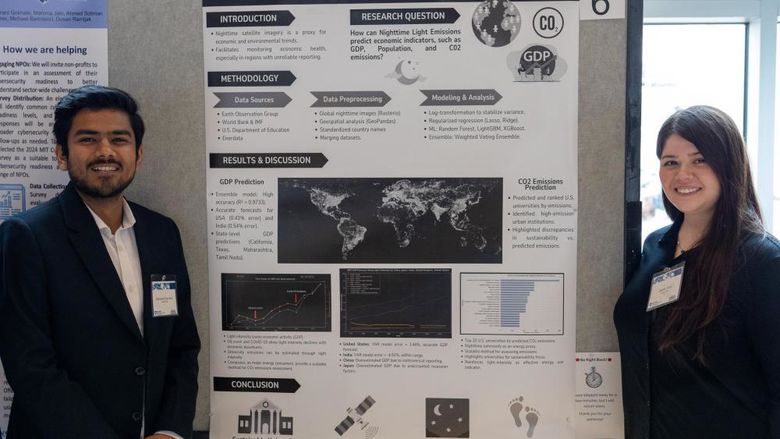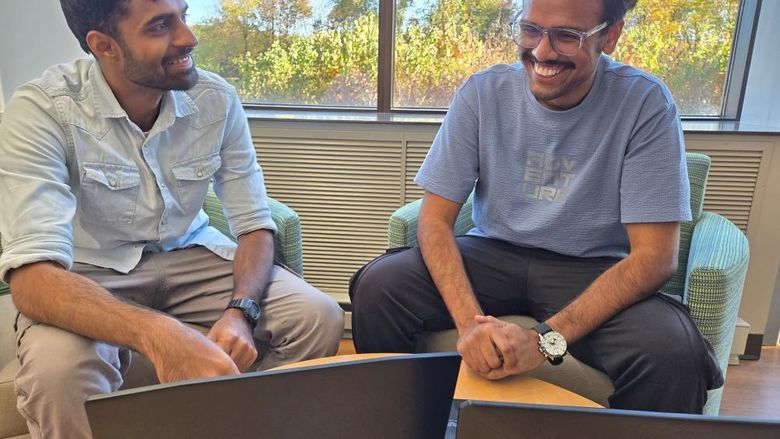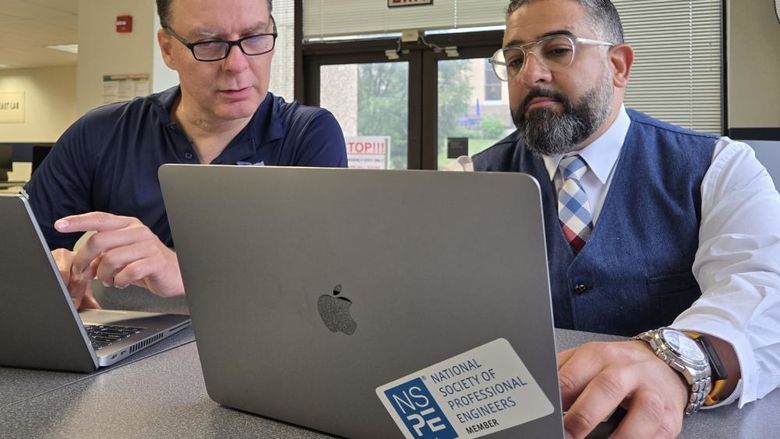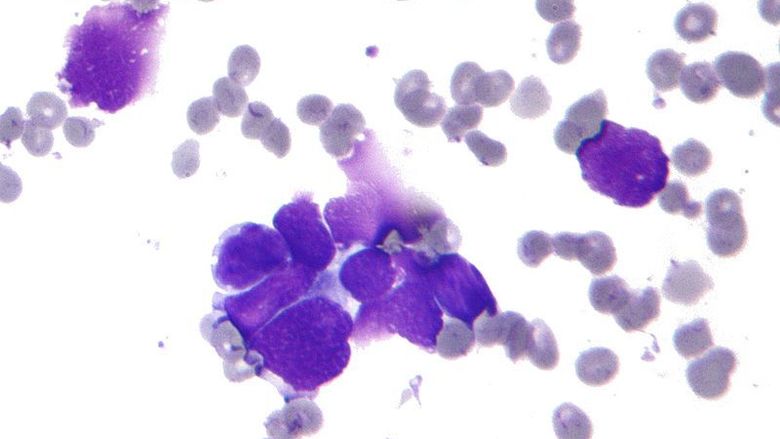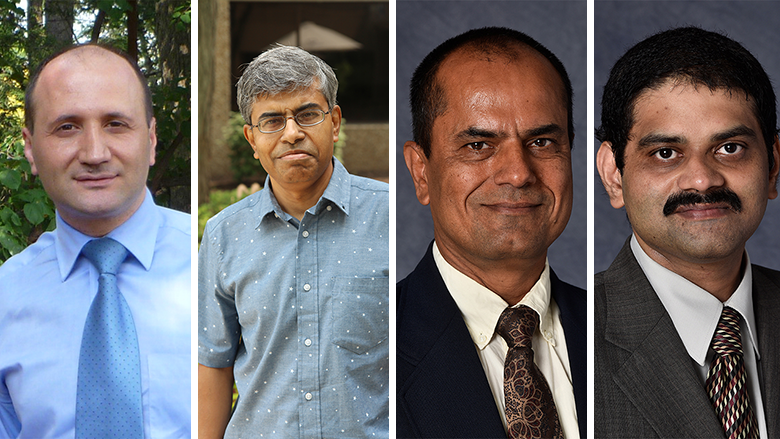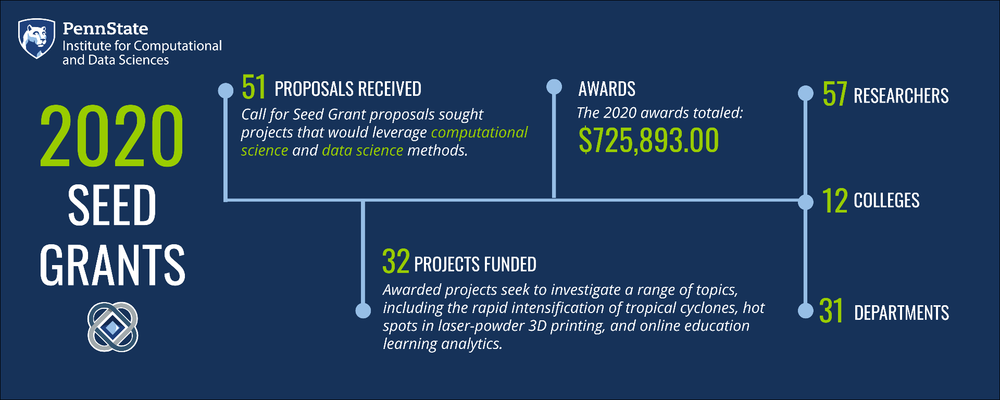
UNIVERSITY PARK, Pa. — Understanding polarized political opinions, predicting Arctic Sea ice levels, and accelerating quantum computing with machine learning — these are just a few focuses of the dozens of new Penn State research projects that have been funded by Institute for Computational and Data Sciences seed grants, in conjunction with supplemental funding from the colleges of Arts and Architecture, Earth and Mineral Sciences; Information Sciences and Technology; Education; and Engineering.
Of the 51 proposals received, 32 projects were funded. ICDS awarded more than $650,000 in funding; together with supplemental funds from colleges, the 32 projects received $725,893.00 in support. The projects include 57 researchers from 12 Penn State colleges and 31 academic departments, as well as the Applied Research Laboratory.
This was the first round of seed grants awarded since the institute changed its name in response to its rapid growth and expanding mission. The record number of proposals received points to how prevalent computational and data sciences are at Penn State.
“The possibilities for applying data science and computational science approaches are endless,” said Jenni Evans, director of ICDS and professor of meteorology and atmospheric science. “Projects such as identifying robust renewable energy policies or investigating risks associated with the child welfare system speak naturally to Penn State's leadership in interdisciplinary research and to the diversity of research made possible in this environment.”
The full list of awarded projects, including principal investigators (PI) and co-PI(s), include:
“WebSciV - Incorporation and visualization of various scientific sources using AI in a multi-layer web-based platform”
- PI: Jean-Paul Armache, assistant professor of biochemistry and molecular biology and ICDS associate
“Automated Design of Multi-Scale Structures: ADeMS”
- PI: Saurabh Basu, assistant professor of industrial and manufacturing engineering
- Co-PI: Christopher McComb, assistant professor of engineering design and mechanical engineering
“A Novel Computational Framework for Large-scale Dam Structural Analysis”
- PI: Pinlei Chen, assistant professor of civil and environmental engineering
“Creation of a maternal-child Medicaid birth cohort to investigate risks of child welfare system involvement in low income households”
- PI: Christian Connell, associate professor of human development and family studies
- Co-PI: Sarah Font, assistant professor of sociology
“Advancing the Use of Deep Learning in Research at Penn State”
- PI: Doug Cowen, professor of physics and astronomy and astrophysics
- Co-PI: Adri Van Duin, professor of mechanical engineering
“Artificial Intelligence Method for Fast and Reliable Interpretation of DFIT and Flowback Data”
- PI: Arash Dahi Taleghani, associate professor of petroleum and natural gas engineering
“Using Network Science to Understand and Counteract Political Opinion Polarization”
- PI: Daniel DellaPosta, assistant professor of sociology and social data analytics
“Pennsylvania Stream Network Modernization: Leveraging LiDAR data to delineate stream networks and inform the regulatory landscape”
- PI: Jon Duncan, assistant professor of hydrology
- Co-PI: Lara Fowler, senior lecturer, Penn State Law
“Application of the causal inference methods in the analyses of obesity paradox: body mass index and mortality in 17,457 older adults”
- PI: Xiang Gao, associate professor of nutritional sciences
- Co-PI: Prasenjit Mitra, professor of information sciences and technology
“Advancing Arctic Sea Ice Prediction Through the Application of Deep Learning”
- PI: Melissa Gervais, assistant professor of meteorology and atmospheric science and ICDS co-hire
- Co-PI: Jian Sun, postdoctoral research scientist, Department of Geosciences
“Exploring Machine Learning to Accelerate Quantum Computing”
- PI: Swaroop Ghosh, Joseph R. and Janice M. Monkowski Career Development Assistant Professor, School of Electrical Engineering and Computer Science
“Using machine-learning methods to dissect the role of complex genetic interactions towards neurodevelopmental phenotypes”
- PI: Santhosh Girirajan, associate professor of biochemistry and molecular biology
- Co-PI: Naomi Altman, professor emeritus of statistics and bioinformatics
“Deep Clean: Gravitational wave inference in non-stationary noise”
- PI: Chad Hanna, associate professor of physics and astronomy and astrophysics; ICDS co-hire
- Co-PI: Bangalore Sathyaprakash, Elsbach Professor of Physics and professor of astronomy and astrophysics
“Empirical evaluation of causal inference-based tests of algorithmic fairness”
- PI: Vasant Honavar, professor and Edward Frymoyer Chair of Information Sciences and Technology
- Co-PIs: Sarah Rajtmajer, assistant professor of information sciences and technology; José Soto, associate professor of psychology and Sherwin Early Career Professor in the Rock Ethics Institute; and Daniel Susser, assistant professor of information sciences and technology
“Integrating High-Throughput Materials Simulations and Deep Machine Learning for Optimizing Microstructures of Advance Energy Storage Materials”
- PI: Sharon Huang, associate professor of information sciences and technology
- Co-PI: Long-Qing Chen, Donald W. Hamer Professor of Materials Science and Engineering
“Computational Phenotyping: Creating a High Performance Computing Infrastructure”
- PI: John Liechty, professor of marketing and statistics
“Solving Surface Shallow Water Equations using Machine Learning Algorithms”
- PI: Xiaofeng Liu, associate professor of civil and environmental engineering and ICDS co-hire
- Co-PI: John Harlim, professor of mathematics and meteorology and atmospheric science, and ICDS co-hire
“Towards Dynamic Patient-centric Personal Health Libraries”
- PI: Fenglong Ma, assistant professor of information sciences and technology and ICDS co-hire
- Co-PI: Sharon Huang, associate professor of information sciences and technology
“Supervised Machine Learning Analysis of Sound in Music Video Mashups”
- PI: Eduardo Navas, associate research professor, School of Visual Arts
- Co-PI: Robert Fraleigh, assistant research professor, Applied Research Laboratory
“Web Services and Infrastructure for Bioinformatics and Biophysics”
- PI: Ed O’Brien, associate professor of chemistry and ICDS co-hire
“From Zombie Ants to Constrained Interactive Networks”
- PI: Christian Peco Regales, assistant professor of engineering science and mechanics
- Co-PI: David Hughes, associate professor of entomology and biology
“Identifying robust near-term renewable energy policies to ensure a healthy and climate-friendly future”
- PI: Wei Peng, assistant professor, School of International Affairs and Department of Civil and Environmental Engineering
- Co-PIs: Klaus Keller: professor of geosciences; Vivek Srikrishnan: assistant research professor, Earth and Environmental Systems Institute
“Direct Numerical Simulations (DNS) of pollutant dynamics near human and indoor surfaces”
- PI: Donghyun Rim, assistant professor of architectural engineering
- Co-PI: Yuan Xuan, assistant professor of mechanical engineering
“An Open-Source Machine Learning Tool for Predictive Modeling of Thermochemical Properties”
- PI: Shun-Li Shang, research professor of materials science and engineering
- Co-PI: Allison Beese, associate professor of materials science and engineering and mechanical engineering
“Refining the pedagogical and learning impact of a machine-learning powered learning analytics dashboard”
- PI: Priya Sharma, associate professor of education
- Co-PI: Mahir Akgun, assistant teaching professor of information sciences and technology
“Measuring and Modeling the Label Dynamics of Online Anti-Malware Engines”
- PI: Linhai Song, assistant professor of Information sciences and technology
“2020 International Conference on Complex Adaptive Systems”
- Satish Srinivasan, associate professor of information science, Penn State Great Valley
“Through the eyes of a child: Simulating the visual input to a developing mind”
- PI: James Wang, professor of information sciences and technology
- Co-PI: Bradley Wyble, associate professor of psychology
“A Machine-Learning Method for Predicting Hotspots in Laser Powder Bed Fusion Additive Manufacturing”
- PI: Qian Wang, professor of mechanical engineering
- Co-PI: Abdalla Nassar, head of Process Physics, Analytics, and Engineering Department (acting), Applied Research Laboratory
“New Methods and Algorithms for Non-convex Problems in Machine Learning and High-Dimensional Data Analysis”
- PI: Lingzhou Xue, associate professor of statistics
- Co-PI: Xiang Zhan, assistant professor of biostatistics, College of Medicine
“Utilizing geometric deep learning to predict the rapid intensification of tropical cyclones”
- PI: Manzhu Yu, assistant professor of geography
“Machine learning of massive real-time environmental monitoring data from Penn State fiber-optic array for mitigating urban geohazards”
- PI: Tieyuan Zhu, assistant professor of geosciences
- Co-PI: Chaopeng Shen, associate professor of civil and environmental engineering

